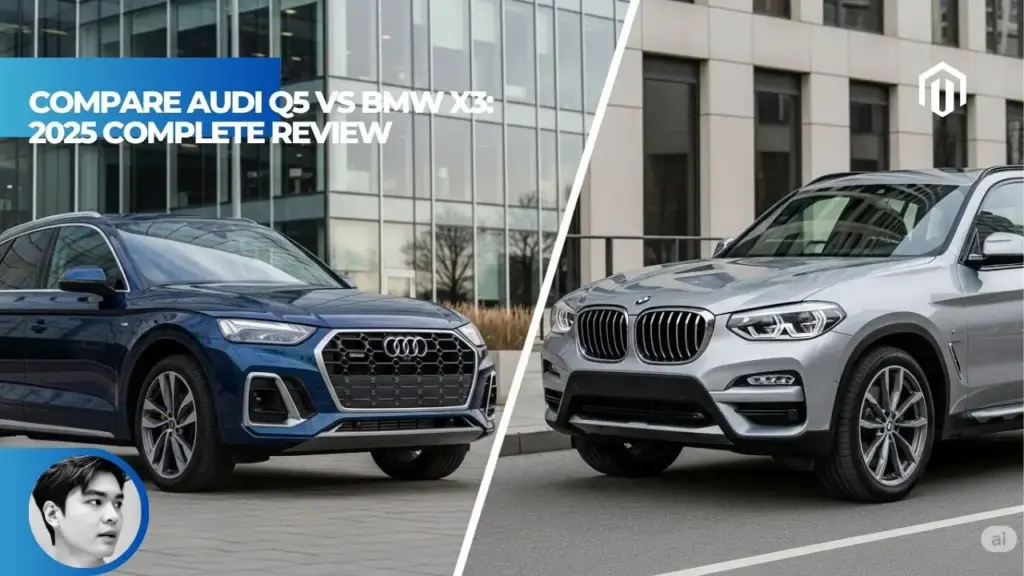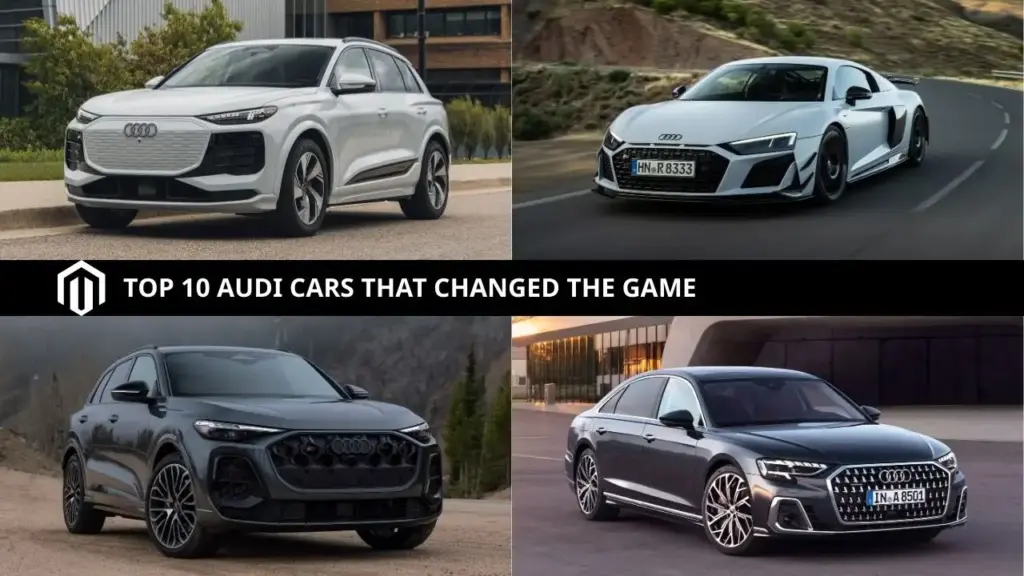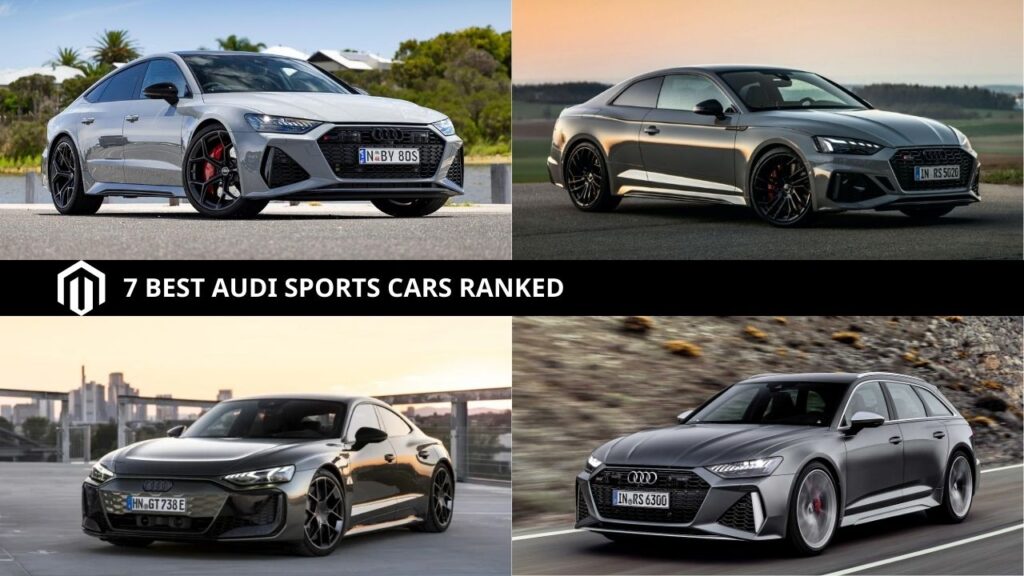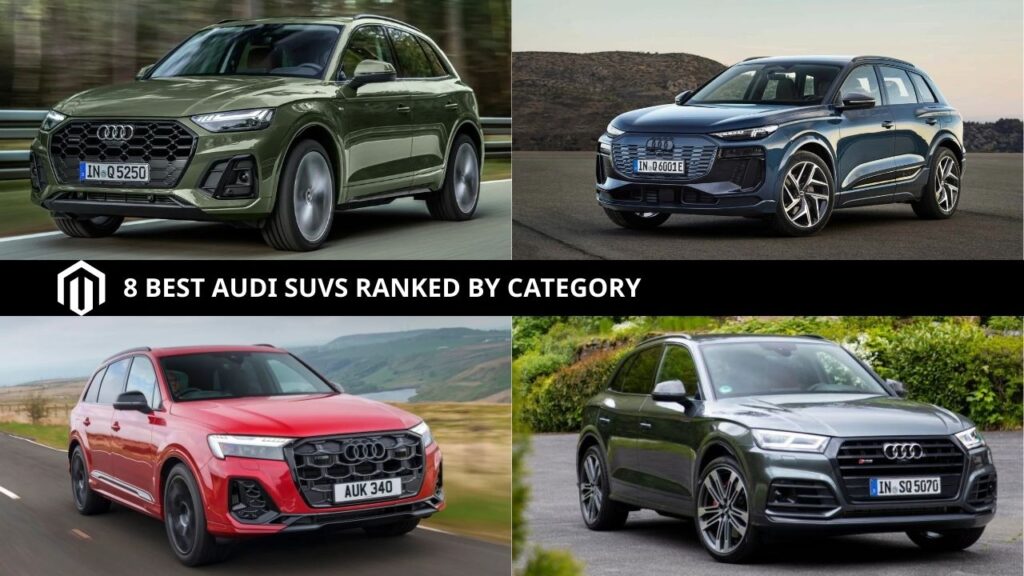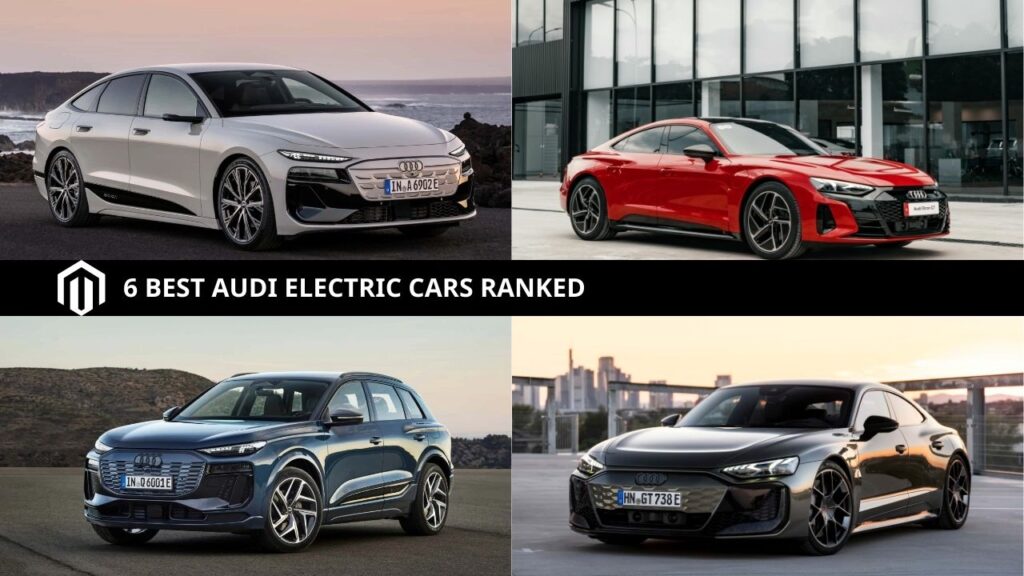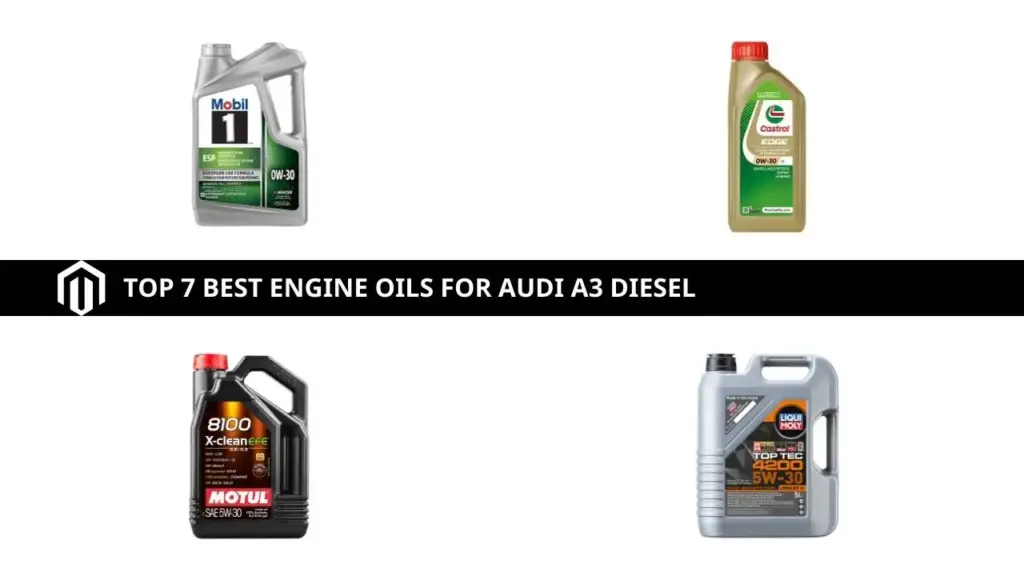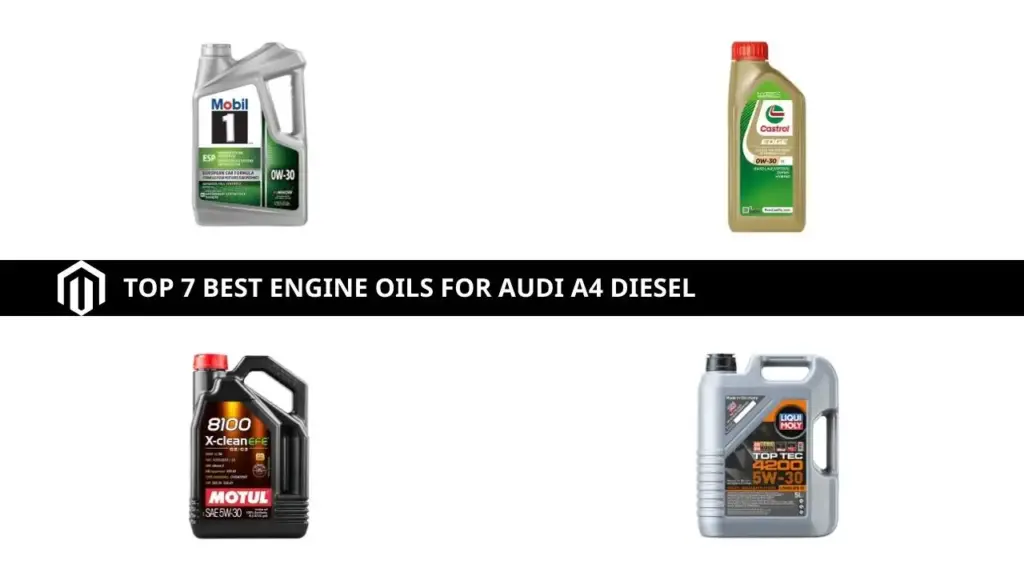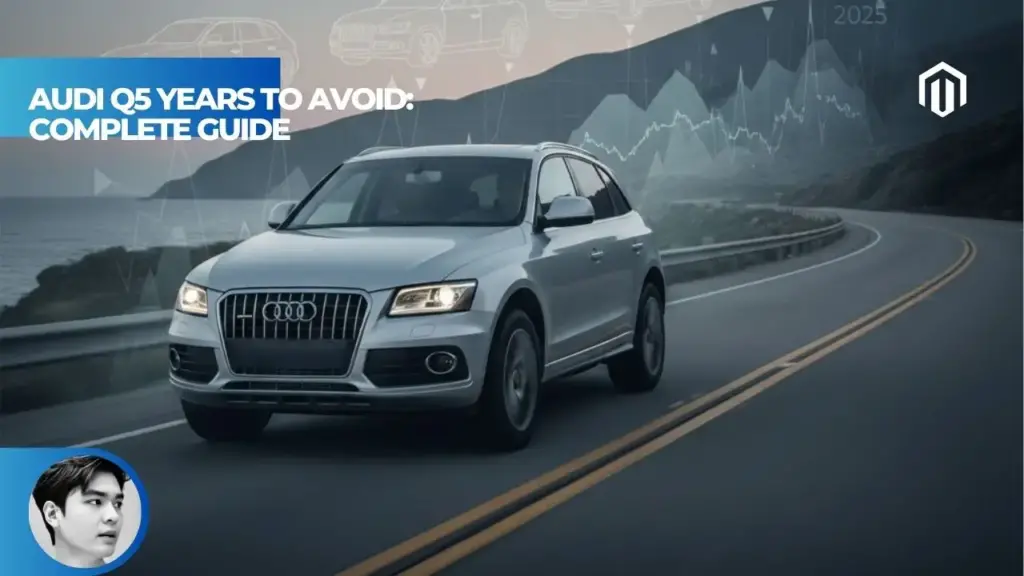You may also like:
The BMW X3 wins for buyers prioritizing fuel efficiency (27/33 mpg vs 23/29 mpg), a sportier driving experience, and a slightly lower starting price of $51,125[1]. The Audi Q5 is the better choice for those wanting more horsepower from the base engine (268 hp vs 255 hp), available air suspension, and Audi’s refined interior with the latest MMI infotainment system, starting at $52,200[2]. Both are fully redesigned for 2025 and represent the best versions of these iconic rivals yet.
Why This Comparison Matters
The Audi Q5 and BMW X3 have been the benchmark compact luxury SUVs for over two decades, representing the core of each brand’s lineup[3]. Both received complete redesigns for 2025, making this comparison more relevant than ever.
These two SUVs share nearly identical market positioning, dimensions, and price points. The choice between them often comes down to driving character preferences—BMW’s traditionally sportier approach versus Audi’s emphasis on refined technology and quattro all-wheel-drive confidence. With both vehicles now on entirely new platforms, the differences are more pronounced than in previous generations[4].
Side-by-Side Specifications
| Criteria | 2025 Audi Q5 | 2025 BMW X3 | Winner |
|---|---|---|---|
| Starting MSRP | $52,200[2] | $51,125[1] | X3 |
| Base Engine | 2.0L Turbo, 268 hp[4] | 2.0L Turbo, 255 hp[1] | Q5 |
| Base Torque | 295 lb-ft (est.) | 295 lb-ft[5] | Tie |
| 0-60 mph | 5.8 sec[6] | 6.0 sec[5] | Q5 |
| EPA Combined | 26 mpg[7] | 29 mpg[6] | X3 |
| Cargo Space | 25.9 cu ft[7] | 28.7 cu ft (est.) | X3 |
| Towing Capacity | 4,400 lbs[8] | 4,400 lbs[8] | Tie |
| Basic Warranty | 4 yrs/50,000 mi[7] | 4 yrs/50,000 mi[1] | Tie |
Design and Interior Quality
Exterior Styling
The 2025 Audi Q5 takes an evolutionary approach, refining its predecessor’s successful design with sharper lines and an updated Singleframe grille[4]. The rear features a Porsche-like full-width LED light bar that distinguishes it from other Audis. Available in standard SUV or Sportback coupe-like configurations, the Q5 maintains understated elegance that ages gracefully.
The 2025 BMW X3 embraces a more dramatic transformation with bolder styling and sharper bodywork[3]. The kidney grilles are prominent but restrained compared to some recent BMWs, finding a middle ground that most buyers appreciate. Notably, non-M variants lack visible exhaust tips entirely, giving the rear a cleaner but potentially less sporty appearance[4].
Interior and Cabin Space
Both vehicles feature significantly upgraded interiors for 2025, though they take different design approaches.
The Audi Q5 cabin centers around a 14.5-inch infotainment touchscreen running Android Automotive OS, paired with a 12-inch digital instrument cluster[4]. An optional 11-inch passenger display adds functionality for front passengers. The overall aesthetic is clean and modern, with premium materials throughout. During extended testing with the previous generation, the Audi’s interior proved exceptionally comfortable for long highway drives.
The BMW X3 features a curved display combining a 12.3-inch instrument cluster and 14.9-inch touchscreen into one unit[4]. The latest iDrive 9 system powers the interface. BMW’s interior uses more physical trim on the door panels compared to the Audi, though the two-spoke steering wheel on base models feels less sporty than Audi’s design[4].
| Dimension | Audi Q5 | BMW X3 |
|---|---|---|
| Length | 186 in[3] | 187 in[3] |
| Wheelbase | 113.0 in | 113.0 in (est.) |
| Cargo Volume | 25.9 cu ft[7] | 28.7 cu ft (est.) |
| Fuel Tank | 18.5 gal[7] | 17.2 gal |
The X3 offers marginally more cargo space, which proves noticeable when loading larger items. Both vehicles seat five comfortably, with adequate rear legroom for adults.
Performance and Efficiency
Engine Options
Both SUVs have been updated with more powerful base engines for 2025:
2025 Audi Q5 Powertrains (US):
- Q5 40 TFSI: 2.0L turbo-4, 268 hp, 7-speed dual-clutch, 0-60 in 5.8 sec[4][6]
- SQ5: 3.0L turbo V6, 367 hp, 0-60 in 4.5 sec[3]
- Q5 55 TFSI e PHEV: 360 hp combined, 23+ miles EV range[2]
2025 BMW X3 Powertrains (US):
- X3 30 xDrive: 2.0L turbo-4, 255 hp, 48V mild hybrid, 8-speed auto, 0-60 in 6.0 sec[1][5]
- X3 M50 xDrive: 3.0L turbo inline-6 (B58), 393 hp, 0-60 in 4.4 sec[1]
The Audi’s base engine produces 13 more horsepower than the BMW’s (268 vs 255), and its 7-speed dual-clutch transmission delivers quicker shifts than the BMW’s 8-speed automatic[4]. However, at the performance end, BMW’s B58 inline-six in the M50 produces 26 more horsepower than the SQ5’s V6 (393 vs 367 hp)[3].
Driving Experience
The BMW X3 maintains BMW’s reputation for engaging driving dynamics[5]. The chassis is superbly tuned, offering confident cornering and responsive steering feedback. However, the available M Sport suspension can feel too stiff for daily use on imperfect roads—a consideration for buyers in regions with rough pavement[5].
The Audi Q5 delivers a more refined, composed driving experience[4]. Quattro all-wheel drive provides excellent traction, and the optional adaptive air suspension (unavailable on the X3) offers up to 6 cm of ride height adjustment for varying conditions[3]. The Q5’s steering feels lighter and less communicative than the BMW’s but is well-suited to relaxed cruising.
Fuel Economy
The BMW X3 has a significant efficiency advantage:
Over 15,000 annual miles, the X3 would save approximately $350 per year in fuel costs compared to the Q5[6]. The BMW’s 48-volt mild hybrid system contributes to this efficiency advantage, enabling engine-off coasting and improved stop-start operation.
For buyers who want even greater efficiency, explore our hybrid SUV comparison guide.
Features and Technology
Both vehicles offer comprehensive standard equipment for the luxury segment:
Both Include:
- Digital instrument cluster and large infotainment display
- Wireless Apple CarPlay and Android Auto
- Heated front seats
- Dual-zone automatic climate control
- LED headlights
- Driver assistance suite (adaptive cruise, lane-keeping)[4]
Audi Q5 Advantages:
- Higher base horsepower (268 vs 255 hp)[4]
- Available adaptive air suspension[3]
- Optional 11-inch front passenger display[4]
- Available Sportback body style[2]
- Plug-in hybrid available in more trims
BMW X3 Advantages:
- Better fuel economy (29 vs 26 mpg combined)[9][7]
- Lower starting price ($51,125 vs $52,200)[1][2]
- More powerful M50 performance variant (393 hp)[1]
- Larger cargo area[3]
- Standard 48V mild hybrid system[1]
For additional German luxury comparisons, see our Audi Q5 vs Genesis GV70 comparison.
Ownership Costs and Value
Purchase Price by Trim
2025 Audi Q5:
| Trim | MSRP |
|---|---|
| Q5 SUV 40 TFSI Premium | $52,200[2] |
| Q5 SUV Premium Plus | $56,000 (est.) |
| Q5 Sportback | $55,900[2] |
| SQ5 SUV | $64,800[2] |
| SQ5 Sportback | $67,600[2] |
2025 BMW X3:
Prices include destination charges.
Real-World Transaction Prices
According to Edmunds, buyers are paying approximately 5% below MSRP for the Audi Q5, translating to potential savings of $2,282 to $3,214 depending on trim[7]. The BMW X3 trades at approximately $47,906 to $63,311 based on Kelley Blue Book Fair Purchase Pricing[10].
Both vehicles require premium fuel and have similar warranty coverage of 4 years/50,000 miles for basic and powertrain protection[7].
Pros and Cons
2025 Audi Q5
Pros:
- More powerful base engine (268 hp vs 255 hp)[4]
- Available adaptive air suspension not offered on X3[3]
- Sportback body style option[2]
- Refined, comfortable highway ride
- Excellent MMI infotainment system[4]
Cons:
- Lower fuel economy (26 vs 29 mpg combined)[7]
- Higher starting price ($52,200 vs $51,125)[2][1]
- Less engaging handling than X3
- Less cargo space (25.9 cu ft)[7]
2025 BMW X3
Pros:
- Better fuel economy (29 mpg combined)[9]
- Lower starting price ($51,125)[1]
- More engaging driving dynamics[5]
- More powerful M50 variant (393 hp)[1]
- More cargo space[3]
Cons:
- Less powerful base engine (255 hp vs 268 hp)[1]
- M Sport suspension can be too stiff[5]
- No air suspension option[3]
- No visible exhaust tips on standard trims[4]
- Base steering wheel design less sporty[4]
Final Verdict: Which Should You Buy?
Choose the Audi Q5 if you:
- Want more power from the base engine (268 hp)[4]
- Prioritize a refined, comfortable ride quality
- Want the option of adaptive air suspension[3]
- Prefer the Sportback coupe-like body style[2]
- Value Audi’s quattro all-weather confidence
Choose the BMW X3 if you:
- Prioritize fuel efficiency (29 vs 26 mpg combined)[9][7]
- Want a sportier, more engaging driving experience[5]
- Need maximum cargo capacity[3]
- Are considering the top M50 performance variant (393 hp)[1]
- Want to spend slightly less upfront[1]
Both SUVs represent the pinnacle of their respective brands’ compact offerings. The X3 edges ahead for most buyers due to its better efficiency and lower price, but the Q5’s available air suspension and Sportback variant give it unique advantages the BMW cannot match.
Frequently Asked Questions
Which is more reliable, the Audi Q5 or BMW X3?
Both vehicles have average reliability ratings for the luxury segment, with neither brand standing out significantly over the other in recent years[1]. German luxury SUVs typically have higher maintenance costs than Japanese alternatives but offer comparable warranty coverage.
Is the Audi Q5 bigger than the BMW X3?
Which has better resale value?
Both vehicles hold value well for the segment, with BMW traditionally having a slight edge in residual values[1]. Resale depends heavily on condition, mileage, and local market conditions.
References
- Car and Driver. (2025). 2025 BMW X3 Review, Pricing, and Specs. https://www.caranddriver.com/bmw/x3-2025
- Audi Elk Grove. (2024). 2025 Audi Q5 Specs: Redesign, Performance & Feature Comparison. https://www.audielkgrove.com/en/2025-audi-q5-specs/
- Autogefühl. (2025). All-new Audi Q5 vs BMW X3 Comparison Review [Video]. YouTube.
- BMW Blog. (2024). Head-to-Head: The 2025 Audi Q5 vs. 2025 BMW X3 Showdown. https://www.bmwblog.com/2024/09/04/2025-audi-q5-vs-2025-bmw-x3-comparison/
- Hagerty Media. (2025). 2025 BMW X3 30 xDrive Review. https://www.hagerty.com/media/new-car-reviews/2025-bmw-x3-30-xdrive-more-is-less/
- CarGurus. (2025). A Compact Luxury Showdown! 2025 Audi Q5 vs 2025 BMW X3 [Video]. YouTube.
- Edmunds. (2025). 2025 Audi Q5 Premium Specs & Features. https://www.edmunds.com/audi/q5/2025/st-402019500/features-specs/
- Car and Driver. (2024). Audi Q5 vs BMW X3 Popular Comparisons. https://www.caranddriver.com/compare/audi-q5-vs-bmw-x3
- TrueCar. (2025). Audi Q5 vs. BMW X3 Comparison. https://www.truecar.com/compare/audi-q5-vs-bmw-x3/
- Kelley Blue Book. (2025). 2025 BMW X3 Price, Reviews, Pictures & More. https://www.kbb.com/bmw/x3/2025/

I am a senior automotive analyst at Autvex. Expert vehicle evaluations, in-depth reviews, and objective analysis helping readers make informed automotive decisions with years of industry experience.

